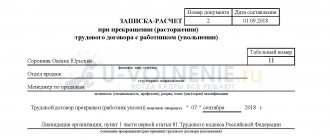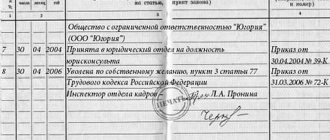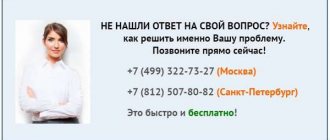Home / Labor Law / Responsibility / Disciplinary
Back
Published: 06/04/2016
Reading time: 9 min
0
4981
State civil servants are identified as a separate category of workers, since their labor is regulated in a special manner. In addition to the Labor Code of the Russian Federation, they are also subject to certain laws and regulations.
There are certain features when imposing a disciplinary sanction on a civil servant . It is worth considering in more detail what types of such penalties can be applied and on what grounds.
- Legislative regulation and types of disciplinary liability
- Grounds for prosecution
- Applying order
- Time limits for bringing to justice
- Situations in which a civil servant cannot be held accountable
Who are government employees?
Since government positions are introduced to exercise the powers of federal bodies and bodies of constituent entities of the Russian Federation, formally the state is considered the employer of such employees, and the head of the government body acts as a representative of the employer. (Article 1 of Federal Law No. 79). When entering the civil service, employees enter into a contract, their activities are financed from the federal or regional budget.
Such a service imposes a number of restrictions, for example, civil servants cannot speak publicly and evaluate the activities of government bodies if this is not part of their official duties.
Civil servants are divided into four categories (Article 9 of Federal Law No. 79):
| Managers | Heads of government bodies and their deputies. They can be appointed for a specific period or indefinitely. |
| Assistants (advisers) | Appointed to assist managers. Their term of office expires simultaneously with the change of leadership. |
| Specialists | People of different professions who ensure that government agencies fulfill their tasks and functions. |
| Supporting specialists | Employees whose tasks include economic, financial, organizational, documentation and other support for the activities of government bodies. |
The term of office of the last two categories of employees is initially unlimited.
Types of penalties
Disciplinary sanctions that can be imposed on civil servants are listed in Art. 57 Federal Law No. 79:
- comment;
- rebuke;
- warning about incomplete job compliance;
- dismissal from the civil service on the grounds provided for in Art. 37 Federal Law No. 79.
Thus, to the three standard types of penalties, one specific one is added - a warning about incomplete compliance. As conceived by legislators, this penalty should be a signal to the person that he is not performing his duties well enough, and to take measures to correct the situation.
Important! For one disciplinary offense, only one penalty can be imposed on civil servants.
Grounds for bringing to disciplinary liability and its essence
Note 1
Disciplinary liability of civil servants is a category of administrative law, one of the methods of coercion that can only be applied by authorized officials (or bodies) to violators for disciplinary offenses.
Disciplinary measures are applied by the authorities of enterprises, institutions, organizations where the violator of discipline works, or by a higher authority. There is currently no single definition for “disciplinary offence”. This definition may be interpreted differently in different legal acts. To improve the legal framework and improve the legal culture of society, it is necessary for the legislator to give a clear and specific definition of the concept of “disciplinary offense”, which will be generally accepted and uniform, containing all the main features.
Finished works on a similar topic
- Course work Disciplinary liability of civil servants 400 rub.
- Abstract Disciplinary liability of civil servants 230 rub.
- Test work Disciplinary responsibility of civil servants 200 rubles.
Receive completed work or specialist advice on your educational project Find out the cost
Legal regulation of disciplinary liability occurs in accordance with Federal Law No. 79-FZ of July 27, 2004 “On the State Civil Service” We have already completed course work
Legal regulation of the state civil service in more detail. The activities of different civil servants have certain characteristics, which also determines the different measures of disciplinary liability applied to them.
Service in government bodies is a public legal category. Disciplinary offenses of civil servants have a negative impact not only on discipline in a particular government agency, but directly or indirectly affect the interests of the entire service in government agencies as a whole. When imposing disciplinary sanctions, it is necessary to completely exclude the interest of individuals in these actions. Only the state, represented by its representatives, can impose disciplinary sanctions.
Do you need to select scientific articles for your academic work? Specify a topic and receive a response in 15 minutes get help
The basis for bringing a civil servant to disciplinary liability is the commission of a disciplinary offense by the employee, that is, improper performance or failure to perform official duties through the fault of the civil servant. However, the legislation does not contain a closed list of disciplinary offenses. Only offenses that are aimed at public interests can be legislated. Such offenses are subject to more stringent disciplinary measures.
What can you be fined for?
According to the law, disciplinary sanctions are imposed for failure to perform or improper performance by a civil servant of his official duties. Important - punishment is possible only if it was his fault. If a person is not to blame for what happened (for example, he did not complete an order because it was objectively impossible), he cannot be punished.
The main responsibilities of civil servants are listed in Art. 15 Federal Law No. 79. In addition to the requirements to carry out the instructions of managers and their official duties provided for by the job regulations, there are the following points:
- comply with the Constitution of the Russian Federation, federal constitutional laws, federal laws, other regulatory legal acts of the Russian Federation, constitutions (charters), laws and other regulatory legal acts of the constituent entities of the Russian Federation and ensure their implementation;
- perform official duties in accordance with official regulations;
- carry out instructions from relevant managers given within the limits of their powers established by the legislation of the Russian Federation;
- observe the rights and legitimate interests of citizens and organizations when performing official duties;
- comply with the official regulations of the government body;
- maintain the level of qualifications necessary for the proper performance of official duties;
- not to disclose information constituting state or other secrets protected by federal law, as well as information that has become known to him in connection with the performance of official duties, including information relating to the private life and health of citizens or affecting their honor and dignity;
- protect state property, including those provided to him for the performance of official duties;
- provide, in the prescribed manner, information provided by federal law about yourself and your family members;
- report renunciation of citizenship of the Russian Federation or acquisition of citizenship of another state on the day of renunciation of citizenship of the Russian Federation or on the day of acquisition of citizenship of another state;
- comply with restrictions (Article 16 Federal Law No. 79), fulfill obligations and requirements for official conduct, not violate the prohibitions (Article 17 Federal Law No. 79) that are established by this Federal Law and other federal laws;
- inform the employer's representative about personal interests in the performance of official duties, which may lead to a conflict of interest, and take measures to prevent such a conflict.
Expert commentary
Gorchakov Vladimir
Lawyer
Thus, the activities of civil servants are regulated quite strictly, and there are quite a lot of grounds for imposing disciplinary sanctions.
How to write a term paper on speech therapy
07.09.2010 213991
These guidelines are compiled to help students gain an understanding of the content and structure of coursework in speech therapy.
Logopedia of pedagogical science that studies anomalies of speech development with normal hearing, explores the manifestations, nature and mechanisms of speech disorders, develops the scientific basis for overcoming and preventing them means of special training and education.
The subject of speech therapy as a science is speech disorders and the process of training and education of persons with speech disorders.
The object of study is a person suffering from a speech disorder.
The main task of speech therapy as a science is the study, prevention and elimination of various types of speech disorders.
Coursework in speech therapy is a student's scientific and experimental research. This type of educational activity, provided for by the educational and professional program and curriculum, contributes to the acquisition of skills in working with literature, analyzing and summarizing literary sources in order to determine the range of insufficiently studied problems, determining the content and methods of experimental research, processing skills and qualitative analysis of the results obtained. The need to complete coursework in speech therapy is due to the updating of knowledge concerning the content, organization, principles, methods and techniques of speech therapy work.
As a rule, during their studies, students must write two term papers - theoretical and practical.
The first course work should be devoted to the analysis and synthesis of general and specialized literature on the chosen topic. Based on this analysis, it is necessary to justify and develop a method of ascertaining (diagnostic) experiment.
In the second course work, it is necessary to provide an analysis of the results obtained during the ascertaining experiment, as well as determine the directions and content of speech therapy work, and select adequate methods and techniques of correction.
So, let’s present the general requirements for the content and design of coursework in speech therapy.
The initial and most important stage of working on a course project is the choice of a topic, which is either proposed by the supervisor or chosen by the student independently from a list of topics that are consistent with the areas of scientific research of the department.
Each topic can be modified, considered in different aspects, but taking into account a theoretical and practical approach. Having chosen a topic, the student needs to think through in detail its specific content, areas of work, practical material, etc., which should be reflected both in the formulation of the topic and in the further construction of the study. It should be recalled that the chosen topic may not only have a purely theoretical orientation, for example: “Dysarthria. Characteristics of the defect”, “Classification of dysgraphia”, but also take into account the practical significance of the problem under consideration, for example: “Speech therapy work on speech correction for dysarthria”. It should also be taken into account that when formulating a topic, excessive detail should be avoided, for example: “Formation of prosodic components of speech in preschoolers of the sixth year of life attending a preschool institution for children with severe speech impairments.”
The course work includes such mandatory parts as: introduction, three chapters, conclusion, bibliography and appendix.
The text of the term paper begins with the title page . An example of its design can be seen here.
Then the content of the work is given, in which the names of chapters, paragraphs, and sections are formulated in strict accordance with the content of the thesis. An example of its design can be seen here.
In the text, each subsequent chapter and paragraph begins on a new page. At the end of each chapter, the materials are summarized and conclusions are formulated.
The introduction reveals the relevance of the problem under consideration in general and the topic being studied in particular; the problem, subject, object, and purpose of the study are defined. In accordance with the goal and hypothesis, objectives and a set of research methods aimed at achieving the objectives must be defined.
The relevance of the topic lies in reflecting the current level of pedagogical science and practice, meeting the requirements of novelty and usefulness.
When defining the research problem, it is important to indicate what practical tasks it will help to implement in training and educating people with speech pathology.
The object of research is understood as certain aspects of pedagogical reality, perceived through a system of theoretical and practical knowledge. The ultimate goal of any research is to improve this object.
The subject of research is some part, property, element of an object, i.e. the subject of research always indicates a specific aspect of the object that is to be studied and about which the researcher wants to gain new knowledge. An object is a part of an object.
You can give an example of the formulation of the object, subject and problem of research:
– The object of the study is the speech activity of preschool children with phonetic-phonemic speech disorders.
– The subject of the study is the features of intonation speech of children with phonetic-phonemic speech disorders.
– The research problem is to determine effective directions for speech therapy work on the formation of intonation expressiveness of speech in the system of correctional intervention.
The purpose of the study contributes to the specification of the object being studied. The goal of any research is to solve a specific problem. The goal is specified in tasks taking into account the subject of research.
The research objectives are formulated in a certain sequence, which determines the logic of the research. The research objectives are set on the basis of a theoretical analysis of the problem and an assessment of the state of its solution in practice.
The first chapter is an analysis of literary sources, which examines the state of this problem in historical and modern aspects, and presents the most important theoretical principles that formed the basis of the study.
When writing the first chapter, you should pay attention to the fact that the text of the course work must be written in a scientific style. When presenting scientific material, it is necessary to comply with the following requirements:
– Specificity – a review of only those sources that are necessary to disclose only a given topic or solve only a given problem;
– Clarity – which is characterized by semantic coherence and integrity of individual parts of the text;
– Logicality – which provides for a certain structure of presentation of the material;
– Reasoning – evidence of thoughts (why this and not otherwise);
– Precision of wording, excluding ambiguous interpretation of the authors’ statements.
A literary review of the state of the problem being studied should not be reduced to a consistent presentation of literary sources. It should present a generalized description of the literature: highlight the main directions (currents, concepts, points of view), analyze in detail and evaluate the most fundamental works of representatives of these directions.
When writing a work, the student must correctly use literary materials, make references to the authors and sources from which the results of scientific research are borrowed. Failure to provide required references will reduce your coursework grade.
As a rule, in coursework on speech therapy, references to literary sources are formatted as follows: the number of the cited source in the general list of references is placed in square brackets. For example: General speech underdevelopment is a speech pathology in which there is a persistent lag in the formation of all components of the language system: phonetics, vocabulary and grammar [17].
When using quotations, in square brackets, in addition to indicating the source number, the page number from which this excerpt is taken is indicated, for example: Speech rhythm is based on a physiological and intellectual basis, since, firstly, it is directly related to the rhythm of breathing. Secondly, being an element that performs a communicative function, “correlates with meaning, i.e. controlled intellectually” [23, P.40].
However, course work should not be of a purely abstract nature, so you should not abuse the unreasonable abundance of citations. Quoting should be logically justified, convincing and used only when really necessary.
In the second chapter , devoted to experimental research, the organization should be described and the program of the ascertaining experiment should be presented. The survey methodology, as a rule, consists of a description of several series of tasks, with detailed instructions, visual and lexical material, the procedure for completing tasks by experiment participants, and scoring criteria. This chapter also provides a qualitative and quantitative analysis of the results obtained.
When analyzing the results of an experiment, it is necessary to use a scoring system. Examples of various criteria for quantitative and qualitative assessment are presented in the following works:
– Glukhov V.P. Formation of coherent speech in preschool children with general speech underdevelopment. - M.: Arkti, 2002. - 144 p.
– Fotekova T.A. Test methodology for diagnosing oral speech of primary schoolchildren. - M.: Arkti, 2000. - 56 p.
– Levchenko I.Yu. Pathopsychology: Theory and practice. - M.: Academy, 2000. - 232 p.
In order to visually present the results obtained during the experimental study, it is recommended to use tables, graphs, diagrams, etc. Histograms can be used in a variety of ways - columnar, cylindrical, planar, volumetric, etc. An example of the design of tables, figures, and histograms can be found here.
The third chapter provides a rationale for the proposed methods and techniques and reveals the content of the main stages of correctional work.
The conclusion contains a summary of the material presented and the main conclusions formulated by the author.
The bibliography must contain at least 25 sources. The list includes bibliographic information about the sources used in preparing the work. An example of its design can be seen here.
In the application you can present bulky tables or illustrations, examination protocols, observation records, products of activity (drawings, written works of children), notes from speech therapy classes, etc.
The volume of one course work must be at least 30 pages of typewritten text.
In general, coursework in speech therapy is the basis for a future thesis, in which the study of the begun problem can be continued, but from the standpoint of a different approach or a comparative analysis of the disorders being studied in different age categories of people with different types of speech disorders.
The content and format of theses in speech therapy can be found here.
Literature:
1. How to write a term paper on speech therapy: Methodological recommendations. Educational and methodological manual / Comp. Artemova E.E., Tishina L.A. / Ed. Orlova O.S. – M.: MGOPU, 2008. – 35 p.
2. Research work of students in the system of higher professional pedagogical education (specialty 031800 - Speech therapy). Methodological recommendations for completing the thesis / Compiled by. L.V. Lopatina, V.I. Lipakova, G.G. Golubeva. - St. Petersburg: Publishing house of the Russian State Pedagogical University named after. A. I. Herzen, 2002. - 140 p.
Why can a civil servant be fired?
Cases where disciplinary action may lead to dismissal are listed in Art. 37 Federal Law No. 79:
- repeated failure to fulfill one’s duties without good reason, if there were other disciplinary sanctions during the year;
- truancy – absence for more than four hours in a row without a valid reason;
- appearing at work under the influence of alcohol or drugs;
- disclosure of state or other secrets protected by law, as well as official information;
- committing theft, embezzlement or intentional damage to someone else's property at the place of work, provided that this fact is confirmed by a court decision or a resolution of the body that considered the case of an administrative offense;
- making an unjustified decision by an employee of the management category that caused the unlawful use of property, violation of its safety or causing other damage to the property of a state body;
- a single gross violation by an employee of a management category of his official duties, if this caused harm to a government agency or violated the legislation of the Russian Federation.
Important! For other disciplinary offenses, if they were committed once, you cannot be dismissed from public service.
Disciplinary measures for state civil servants
The responsibilities of a person holding a position in the state civil service are those job responsibilities that are assigned to the employee to solve the problems of the relevant public administration body. When a person holding a position in the state civil service does not exercise the powers granted to him in strict accordance with the law, the goals and objectives of the functioning of the public administration body, then not only are the results of public administration useful for society as a whole and individual spheres of public life not achieved, but also harmed direct damage to the interests of society and the individual. The above updates the issues of liability of employees for the culpable performance of their official duties in an improper form or failure to fulfill such duties.
Need help creating a study plan? Specify a topic and receive a response in 15 minutes get help
Note 1
Illegal behavior of employees can be characterized as a criminal or administrative offense or as a disciplinary offense.
A disciplinary offense in the civil service as a basis for disciplinary liability is characterized by the following features:
- this is a violation of official duties by the employee;
- it is an act in the form of omission or action;
- it is a culpable act by an employee;
- This is an act that does not pose a public danger.
The provisions of special federal legislation provide for the following types of penalties as measures of disciplinary liability for employees:
- comment;
- rebuke;
- warning the person holding a position in the state civil service about his incomplete compliance with the position held;
- dismissal of an employee.
It should be noted that the above disciplinary measures against civil servants are defined exhaustively by law. However, the order of their arrangement in the article does not provide for the need for their sequential application: the penalty applied is determined by the severity of the offense committed by the civil servant and other circumstances.
For an employee committing one offense, only one penalty can be applied to him. It is important to emphasize here that during the period while the employee is being checked by the employer for a disciplinary offense, he may be removed from service. Such suspension cannot be considered as a disciplinary sanction.
Rules for imposing penalties
When imposing a penalty, a certain procedure must be followed. Without this, the punishment will be legally considered illegal, even if formally its application is fair. The procedure is regulated by Art. 58 Federal Law No. 79 and generally coincides with a similar procedure for other categories of employees described in Art. 193 Labor Code of the Russian Federation. However, there are specific nuances here that relate mainly to the investigation of the incident.
Article 58 Federal Law No. 79 - Procedure for applying and lifting disciplinary sanctions
- Before applying disciplinary action, the employer's representative must request an explanation in writing from the civil servant. If a civil servant refuses to give such an explanation, a corresponding act is drawn up. The refusal of a civil servant to give an explanation in writing is not an obstacle to applying a disciplinary sanction.
- Before applying a disciplinary sanction, an internal review is carried out.
- When applying a disciplinary sanction, the severity of the disciplinary offense committed by a civil servant, the degree of his guilt, the circumstances under which the disciplinary offense was committed, and the previous results of the civil servant performing his official duties are taken into account.
- A disciplinary sanction is applied immediately after the discovery of a disciplinary offense, but no later than one month from the date of its discovery, not counting the period of temporary incapacity for work of a civil servant, his stay on vacation, other cases of his absence from service for good reasons, as well as the time of an internal inspection.
- A disciplinary sanction cannot be applied later than six months from the date of commission of a disciplinary offense, and based on the results of an inspection of financial and economic activities or an audit - later than two years from the date of commission of a disciplinary offense. The specified time limits do not include the time of criminal proceedings.
- A copy of the act on the application of a disciplinary sanction to a civil servant, indicating the grounds for its application, is handed over to the civil servant against signature within five days from the date of publication of the relevant act.
- A civil servant has the right to appeal a disciplinary sanction in writing to the commission of a state body on official disputes or to court.
- If, within one year from the date of application of the disciplinary sanction provided for in paragraphs 1 - 3 of part 1 of Article 57 of this Federal Law, and the penalty provided for in Article 59.1 of this Federal Law, a civil servant is not subjected to a new disciplinary sanction, he is considered to have no disciplinary sanction.
- The employer's representative has the right to remove a disciplinary sanction from a civil servant before the expiration of one year from the date of application of the disciplinary sanction on his own initiative, at the written request of the civil servant or at the request of his immediate supervisor.
When it becomes known about an offense that is subject to disciplinary liability, a written explanation is required from the employee. Refusal to provide an explanation is not an obstacle to the subsequent imposition of penalties, but must be recorded in a separate act.
Explanatory note of a civil servant (sample)
Next, it is necessary to conduct an internal audit (Article 59 of Federal Law No. 79). Based on its results, the commission draws up a conclusion, which indicates the need for disciplinary action.
Expert commentary
Kolesnikova Anna
Lawyer
When imposing a disciplinary sanction, it is necessary to take into account the severity of the offense and the circumstances of its commission, the degree of guilt of the employee and how he previously performed his duties.
Sanctions can be applied no later than one month from the date of discovery of the offense. This time does not include the period when the guilty employee was on vacation, on sick leave or absent for other valid reasons. The time required for the official check is also not taken into account.
The maximum period during which disciplinary sanctions can be applied to the perpetrator is six months from the date of commission of the offense. Thus, if the fact of the offense comes to light after seven months, it cannot be held accountable for it. An exception is violations identified as a result of a financial or audit. The statute of limitations for them is two years. If a criminal case is initiated as a result of the violation, the statute of limitations is also suspended during the investigation.
Service check
An internal inspection is carried out upon detection of a disciplinary offense; it can be initiated by a representative of the employer or another government employee. The latter must submit a written application, on the basis of which the employer’s representative makes a decision to conduct an inspection.
The procedure for internal inspection is regulated by Art. 59 Federal Law No. 79. The audit is carried out by the personnel department of the government body, the legal department and the trade union of this body. If there is an employee on the commission who is directly or indirectly interested in the results of the audit, he must recuse himself. If he does not do this, the commission's findings will be invalid.
During the inspection, the commission must establish:
- whether a disciplinary offense was actually committed;
- whether the action (inaction) contains signs of guilt;
- what reasons and circumstances contributed to the violation;
- the nature and extent of the harm that the perpetrator caused by his offense;
- circumstances that prompted the employee to write a statement about the inspection.
A month is allotted for the internal audit from the date of the decision to conduct it. At the same time, the law allows the person under investigation to be removed from work while maintaining pay. The decision on the advisability of such a measure is made by the representative of the employer.
While the audit is ongoing, the employee whose activities are being audited has the right to:
- give explanations orally or in writing, submit petitions, write statements and submit other documents to defend yourself and justify your action;
- file a complaint against the decisions and actions (inaction) of the persons conducting the inspection to the representative of the employer who appointed it;
- upon completion of the inspection, familiarize yourself with its results and materials, unless this violates the conditions for maintaining state or other secrets.
Based on the results of the inspection, the commission draws up a conclusion, which sets out the facts established during the investigation and its proposals for further sanctions against the civil servant. Based on the conclusion, an act on the application of a disciplinary sanction is drawn up. It must be handed over to the guilty employee within five days after issuance.





